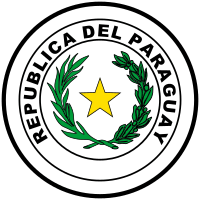Politics of Paraguay
Politics of Paraguay takes place in a framework of a presidential representative democratic republic.
 |
|---|
| This article is part of a series on the politics and government of Paraguay |
|
Legislature
|
|
Administrative divisions |
|
|
|
|
The National Constitution mandates a separation of powers in three branches. Executive power is exercised solely by the President. Legislative power is vested in the two chambers of the National Congress. The Judiciary power is vested on Tribunals and Courts of Civil Law and a nine-member Supreme Court of Justice, all of them independent of the executive and the legislature.
The Economist Intelligence Unit rated Paraguay a "flawed democracy" in 2019.[1]
Constitution
Paraguay's highly public government was fundamentally changed by the 1992 constitution, which reinforced a division of powers (between legislative, judiciary and executive) that in the last two Constitutions existed mostly in writing.
Executive branch
| Office | Name | Party | Since |
|---|---|---|---|
| President | Mario Abdo Benítez | Colorado Party | 15 August 2018 |
The president, popularly elected for a 5-year term, appoints a cabinet. The president nominates the Council of Ministers. The presidential elections of 2008 were won by Fernando Lugo, a Roman Catholic bishop whose ministerial duties have been suspended on his request by the Holy See. It was the first time in 61 years that the Colorado Party lost a presidential election in Paraguay, and only a second time that a leftist will serve as president (first time was in 1936–37) and first time freely elected.
The workplace of the President of Paraguay is the Palacio de los López, in Asuncion. The Presidential Residence is Mburuvichá Roga, also in Asuncion.
Once presidents leave office, they are granted by the Constitution the speaking-but-non-voting position of Senator for life.
Office of the First Lady
In Paraguay, the post of First Lady is official, and thus the Office of the First Lady the Nation of the Republic of Paraguay was created.
According to Paraguayan law, this office depends structurally and financially upon the Presidency of the Republic. The office exercises mainly social functions, but also those related to health, through the REPADEH Foundation.
Legislative branch
The National Congress (Congreso Nacional) has two chambers. The Chamber of Deputies (Cámara de Diputados) has 80 members, elected for a five-year term by proportional representation. The Chamber of Senators (Cámara de Senadores) has 45 members, elected for a five-year term by proportional representation.
Political parties and elections
| Summary of the 20 April 2008 Paraguayan presidential election results | |||
| Candidate | Party | Votes | % |
|---|---|---|---|
| Fernando Lugo | Patriotic Alliance for Change (Alianza Patriótica por el Cambio) | 704,966 | 42.3 |
| Blanca Ovelar | Colorado Party (Asociación Nacional Republicana – Partido Colorado) | 530,552 | 30.6 |
| Lino Oviedo | National Union of Ethical Citizens (Unión Nacional de Ciudadanos Éticos) | 379,571 | 21.9 |
| Pedro Fadul | Beloved Fatherland Movement (Movimiento Patria Querida) | 41,004 | 2.5 |
| Sergio Martínez E. | Paraguayan Humanist Party (Partido Humanista Paraguayo) | 5,852 | 0.4 |
| Horacio Galeano Perrone | Tetã Pyahu Movement (Movimiento Tetã Pyahu) | 2,788 | 0.1 |
| Julio López | Workers' Party (Partido de los Trabajadores) | 2,288 | 0.1 |
| Invalid/blank votes | 59,885 | 3.5 | |
| Total | 1,726,906 | 100 | |
| Registered voters/turnout | – | 65.6 | |
| Source: Adam Carr's Election Archive | |||
Template:Paraguayan legislative election, 2009
Judicial branch
Paraguay's highest court is the Supreme Court of Paraguay. The Senate and the president select its nine members on the basis of recommendations from a constitutionally created Magistrates Council. The Supreme Court supervises all other components of the judicial branch, which include appellate courts with three members each in the areas of criminal, civil, administrative, and commercial jurisdiction; courts of first instance in these same four areas; justices of the peace dealing with more minor issues; and military courts.
Administrative divisions
The Constitution of Paraguay quotes "The law will regulate the various areas in which these officials and employees can provide their services, including the judicial, the diplomatic and consular professions, the areas of scientific and technological research, civil services, military and police. This will not preclude others. " Each of Paraguay's 17 departments is headed by a popularly elected governor. Paraguay is divided in 17 departments (departamentos, singular – departamento) and one capital city; Alto Paraguay, Alto Paraná, Amambay, Asunción (city), Boquerón, Caaguazú, Caazapá, Canindeyú, Central, Concepción, Cordillera, Guairá, Itapúa, Misiones, Ñeembucú, Paraguarí, Presidente Hayes, San Pedro.
International organization participation
CCC, ECLAC, FAO, G-77, IADB, IAEA, IBRD, ICAO, ICC, ICFTU, ICRM, IDA, IFAD, IFC, IFRCS, ILO, IMF, IMO, Intelsat, Interpol, IOC, IOM, ISO (correspondent), ITU, LAES, LAIA, Mercosur, NAM (observer), OAS, OPANAL, OPCW, PCA, RG, UN, UNASUR, UNCTAD, UNESCO, UNIDO, UPU, WCL, WHO, WIPO, WMO, WToO
See also
- The Stronato.
References
- The Economist Intelligence Unit (8 January 2019). "Democracy Index 2019". Economist Intelligence Unit. Retrieved 13 January 2019.
.svg.png)